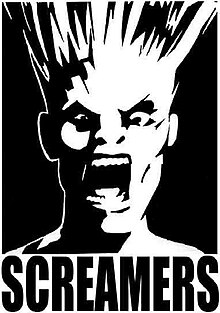The Screamers
| The Screamers | |
|---|---|
 |
|
| Background information | |
| Also known as | The Tupperwares |
| Origin | Los Angeles, California, United States |
| Genres | Punk rock, synthpunk |
| Years active | 1975–1981 |
| Labels | Dangerhouse Records |
| Associated acts |
|
| Past members |
Tomata du Plenty Tommy Gear Rio de Janeiro Pam Lillig Ben Witz Bill Rieflin Eldon Hoke K. K. Barrett David Brown Paul Roessler |
The Screamers were an American electropunk group founded in 1975. They were among the first wave of the L.A. punk rock scene. The Los Angeles Times applied the label "techno-punk" to the band in 1978. In the documentary Punk: Attitude (2005), the Dead Kennedys cite the Screamers as a key influence on their group and as one of the great unrecorded groups in rock history.
The Screamers were noted for unusual instrumentation, featuring synthesizer (ARP Odyssey) and electric piano (Fender Rhodes). Additional musicians, including violinists and a female vocalist, were occasionally incorporated into their performances. The group featured a theatrical presentation that centered on manic lead vocalist, Tomata du Plenty. DuPlenty and Tommy Gear, a keyboard player and vocalist, were the band's principal songwriters.
The Screamers' founders Tomata du Plenty (born David Xavier Harrigan) and Tommy Gear first collaborated in Seattle in 1975, where they formed The Tupperwares. The original lineup of the Tupperwares included Tommy Gear (at the time, using the name "Melba Toast"), Tomata du Plenty, and Rio de Janeiro on vocals, backed by Pam Lillig and Ben witz (later of Girls), as well as Bill Rieflin (later of The Blackouts and Ministry) and a teenage Eldon Hoke (later known as "El Duce" of The Mentors).
In late 1976, after legal threats from Tupperware trademark owners, the band's name was changed to the Screamers. The trio Tomata, Tommy, Rio migrated to Los Angeles, leaving the other band members behind. Shortly after arriving in Los Angeles, Rio de Janeiro left the band due to creative differences and they added David Brown and drummer K. K. Barrett. Brown soon left to found the seminal punk label Dangerhouse Records; he was replaced by Paul Roessler.
...
Wikipedia
